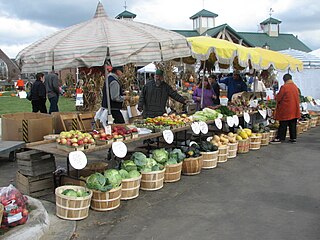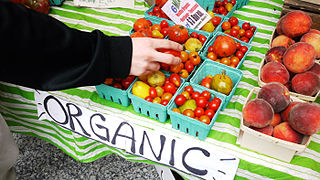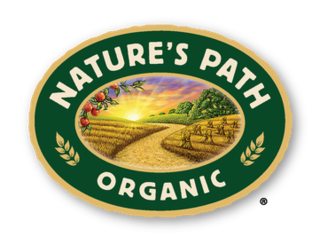
Fair trade is a term for an arrangement designed to help producers in developing countries achieve sustainable and equitable trade relationships. The fair trade movement combines the payment of higher prices to exporters with improved social and environmental standards. The movement focuses in particular on commodities, or products that are typically exported from developing countries to developed countries but is also used in domestic markets, most notably for handicrafts, coffee, cocoa, wine, sugar, fruit, flowers and gold.

Community-supported agriculture or cropsharing is a system that connects producers and consumers within the food system closer by allowing the consumer to subscribe to the harvest of a certain farm or group of farms. It is an alternative socioeconomic model of agriculture and food distribution that allows the producer and consumer to share the risks of farming. The model is a subcategory of civic agriculture that has an overarching goal of strengthening a sense of community through local markets.

A farmers' market is a physical retail marketplace intended to sell foods directly by farmers to consumers. Farmers' markets may be indoors or outdoors and typically consist of booths, tables or stands where farmers sell their produce, live animals and plants, and sometimes prepared foods and beverages. Farmers' markets exist in many countries worldwide and reflect the local culture and economy. The size of the market may be just a few stalls or it may be as large as several city blocks. Due to their nature, they tend to be less rigidly regulated than retail produce shops.

The organic movement broadly refers to the organizations and individuals involved worldwide in the promotion of organic food and other organic products. It started during the first half of the 20th century, when modern large-scale agricultural practices began to appear.

Organic certification is a certification process for producers of organic food and other organic agricultural products, in the European Union more commonly known as ecological or biological products. In general, any business directly involved in food production can be certified, including seed suppliers, farmers, food processors, retailers and restaurants. A lesser known counterpart is certification for organic textiles that includes certification of textile products made from organically grown fibres.
The United Farmers of Ontario (UFO) was an agrarian and populist provincial political party in Ontario, Canada. It was the Ontario provincial branch of the United Farmers movement of the early part of the 20th century.
Better Business Bureau (BBB) is a private, 501(c)(6) nonprofit organization founded in 1912. BBB's self-described mission is to focus on advancing marketplace trust, consisting of 97 independently incorporated local BBB organizations in the United States and Canada, coordinated under the International Association of Better Business Bureaus (IABBB) in Arlington, Virginia.
Direct Energy LP is a North American retailer of energy and energy services. The company was founded in Toronto in 1986 and now has more than four million customers in Canada and the United States. Direct Energy is a subsidiary of NRG Energy.

Sustainable forest management (SFM) is the management of forests according to the principles of sustainable development. Sustainable forest management has to keep the balance between three main pillars: ecological, economic and socio-cultural. Sustainable forestry can seem contradicting to some individuals as the act of logging trees is not sustainable. However, the goal of sustainable forestry is to allow for a balance to be found between ethical forestry and maintaining biodiversity through the means of maintaining natural patterns of disturbance and regeneration. The forestry industry mitigates climate change by boosting carbon storage in growing trees and soils and improving the sustainable supply of renewable raw materials via sustainable forest management. Successfully achieving sustainable forest management will provide integrated benefits to all, ranging from safeguarding local livelihoods to protecting biodiversity and ecosystems provided by forests, reducing rural poverty and mitigating some of the effects of climate change. Forest conservation is essential to stop climate change.
Panago is a privately held Canadian pizza delivery and takeout chain with approximately 200 locations across six provinces. It was founded in 1986 by the Rooke Family. Panago is a franchise business with each location being franchisee-owned and operated. In 2015, Panago generated over 150 million dollars in sales.
Sustainable procurement is a process whereby organizations meet their needs for goods, services, works and utilities in a way that achieves value for money on a life-cycle basis while addressing equity principles for sustainable development, therefore benefiting societies and the environment across time and geographies. Procurement is often conducted via a tendering or competitive bidding process. The process is used to ensure the buyer receives goods, services or works for the best possible price, when aspects such as quality, quantity, time, and location are compared. Procurement is considered sustainable when organizations broadens this framework by meeting their needs for goods, services, works, and utilities in a way that achieves value for money and promotes positive outcomes not only for the organization itself but for the economy, environment, and society. This framework is also known as the triple bottom line, which is a business accounting framework. The concept of TBL is narrowly prescribed, and even John Elkington, who coined the term in the 1990s, now advocates its recall. Indeed, procurement practitioners have drawn attention to the fact that buying from smaller firms, locally, is an important aspect of sustainable procurement in the public sector. Ethics, culture, safety, diversity, inclusion, justice, human rights and the environment are additionally listed as important aspects of SPP.

Haliburton—Kawartha Lakes—Brock is a provincial electoral district in Central Ontario, Canada. It elects one member to the Legislative Assembly of Ontario.

Mike Schreiner is a Canadian politician who has served as the leader of the Green Party of Ontario since 2009. Schreiner sits as a member of Provincial Parliament (MPP), representing Guelph; his 2018 election made him the first and only Green Party member elected to the Legislative Assembly of Ontario.

Marin Organic is a non-profit 501(c)(3) association of organic producers headquartered in Point Reyes Station, California. Founded in 1999 with the goal of creating the first all-organic county, Marin Organic is known for working with the government, community groups and organizations, fellow ranchers and farmers to advance the practice of sustainable, organic production. The organization is internationally recognized model for building economically viable, community-based local foodsheds.

Nature's Path Foods, commonly known as Nature's Path, is a privately held, family-owned producer of certified organic foods. Originally known for its breakfast cereals, it now has a portfolio of more than 150 products. Founded in 1985 by Arran and Ratana Stephens, Nature's Path employs approximately 500 people, with manufacturing facilities in Canada and the United States and sales in more than 40 countries. All of its products are vegetarian, certified organic, and Non-GMO Project Verified. Nature's Path is a triple bottom line social enterprise, and has been recognized for incorporating the notion of sustainability into its business practices through its support of various charitable and eco-friendly initiatives. The company is regularly named one of Canada's best employers.
Sustainable products are those products that provide environmental, social and economic benefits while protecting public health and environment over their whole life cycle, from the extraction of raw materials until the final disposal.
Florida Certified Organic Growers and Consumers, also known as Florida Organic Growers or FOG, is a non-profit organization founded in 1987. It is classified as a 501(c) corporation. One of the main facets of FOG is Quality Certification Services, a program that extends through 30 states and 14 countries. FOG is also concerned with community outreach and education in order to promote healthy organic lifestyles and social equity.

The Ontario Sustainable Energy Association (OSEA) is a non-profit organization supporting the growth of renewable energy and Community Power projects in the Canadian Province of Ontario. OSEA advocated an advanced renewable energy Feed-in Tariff program for Ontario, resulting in the creation of the Renewable Energy Standard Offer Program, a precursor to the Green Energy Act and, in 2007, the most progressive energy policy in North America in a decade. OSEA has approximately 130 community and industry members as well as individual members. The affairs of the association are managed by a board of directors elected by the membership.
Fairtrade bananas was a marketing initiative which focused on increasing the price paid to small banana growers and the wages of agricultural workers. This is not a commercial brand, but a marketing strategy. Fair trade is based on higher prices paid by consumers that allow an equitable distribution of gains from trade over the chain partners.










